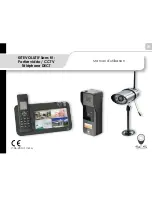
rinnai new Zealand Limited
E-Frost Solar Collector Split System
install manual: 11497-a
23
Consenting requirements for solar
The following information is from the EECa Solar Water Heating Guidebook, Version 1, October
2006, Section 2.
The installation of a solar hot water heating system requires a Building Consent
because solar water heating systems interact with potable water supplies and can
involve heavy loads on roof structures if the hot water cylinder is mounted on the
roof.
a Building Consent is also required where there is a change to a potable water
supply system and to the heat source. Other permits may be required to cover
electrical alterations, or where there is a building height restriction.
all plumbing work will require certification by a craftsman plumber. a registered
electrician will need to certify any electrical work that may be needed. Certifications
may be in the form of a Producer Statement as required by the Building Consent.
Solar water heating installers should ensure that any necessary Building Consents
are obtained and adhered to. an installer must then be able to demonstrate to the
Consent authority that the installation meets the requirements of the new Zealand
Building Code.
For new dwellings, the solar water heating system is usually included in the
overall consent for the building. in this case the plumbing approval is usually
done by the designer, specifier or the plumbing contractor. Structural approval is
done during the process of approving the design of the trusses with the trusses
merchant, by taking into account the specific load of the hot water cylinder (not
applicable if the system does not have a cylinder on the roof).
For installing solar water heating on existing dwellings, the installers usually
provide a signed Producer Statement confirming they have installed the solar
water heating system according to the requirements of the new Zealand Building
Code.
if the hot water cylinder is not on the roof, the Building Consent should be
submitted as a minor plumbing alteration. However, when the cylinder is on the
roof, the city council will require evidence that the existing structure can cope with
the load.
System suppliers often provide pre-prepared supporting documentation to
accompany an application to help installers obtain Building Consents with the
minimum effort. The documentation may include acceptable structural support
arrangements for specific system models.
•
•
rinnai has developed a G12 aS2 rinnai Solar Compliance document to assist with the consent
process. This can be found on our technical website www.rinnai-tradesmart.co.nz within the
Solar section.


































